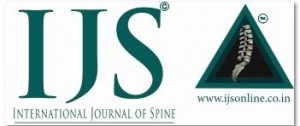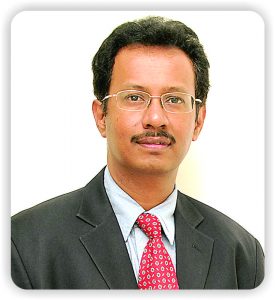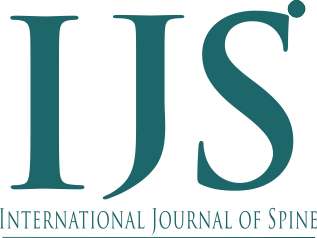Interview with Dr Rajasekaran: Part I
Volume 1 | Issue 2 | Sep – Dec 2016 | Page 3-6 | Prof. S. Rajasekaran
Authors : Prof. S. Rajasekaran
M.S., DNB., F.R.C.S.(Ed)., M.Ch(Liv)., FACS., F.R.C.S.(Eng)., Ph.D
Chairman, Dept of Orthopaedics, Trauma & Spine Surgery.
Ganga Hospital, Coimbatore.
Prof. S Rajasekaran
One of the most Revered Academicians and most decorated Spine surgeon in India, Dr Rajasekaran has inspired an entire generation of Orthopaedic Surgeons across the country. This interview is an attempt to gain an insight into Dr Rajasekaran as a human being as an academician and as an Orthopaedic Surgeon
This interview with Dr S Rajasekaran (SR) was conducted at Kochi at the venue of IOACON 2016. The interview was conducted by Dr Ketan Khurjekar (KK) and Dr Ashok Shyam (AKS). The purpose of this interview was to know more about the journey of Dr Rajasekaran and also to catch a glimpse of his life and personality. A broader objective is to attract people to excellence in orthopaedics and to have pride in our own people who have done exceptionally well in reaching international acclaim in respective fields. This is part I of the interview and part II will be published in the forthcoming issue.
KK: Today you are at cross roads or rather in middle of world orthopaedic landscape and have experienced so many things. You were the IOA president and know about the national scenario and you are now involved in many international association including SICOT, SRS and AO spine. You are exposed to working in India as well as the western world. What are the differences that you perceive between the two worlds and how can we can attain the next level especially in terms of western world?
SR: Successful persons worldwide share the common trait of being focussed and hardworking. Indians as a rule, we work hard (may be even harder than the west) but the western world works with more focus and planning. We work hard and grow but they plan ahead and work towards the goals. Our growth is a more like an organic growth. We all are better than what we were 10 years ago but most of our growth is unplanned. When you don’t have a planned and targeted growth, you often don’t achieve or reach your greatest potential. For example, say a department did 1000 surgeries a year and 1100 the following year. This represents a growth of 10% and one can be happy about it. But the other way of looking at it is if the growth could have been up to 2000 surgeries? To achieve this type of growth, planning in advance is essential. Once a realistic goals have been set, timely audit, at least every every 3 months and a critical appraisal of performance will help to achieve the targets. Otherwise, performance deficit is common.
We have to realise that time waits for no body and keeps on moving. All of us have only a certain amount of time and certain of amount energy and this has to be channelised and not wasted. So we have to have concentrate our time and energy towards our targets. When you are doing things that you don’t need to do, then there is very little time to do what you really want to do. Every activity that is undertaken that is not in line with the long or short term plan, actually amounts to distraction. So we have to learn to say ‘No’ to things that waste our time.
Goals also have to be very specific rather than vague. Every new year, probably most of us aim to be better surgeons and to do more surgeries. But these will be the goals of every orthopaedic surgeon and is very nonspecific, without concrete plans or strategies. Plans need to be specific, time bound, realistic and tangible. And this makes a very huge difference.
Growth is either organic or planned. Orthopaedic speciality in India is growing by 15 to 18% every year. If one is growing at rate of 15%, you can’t take pride in that as you are riding the general growth of the speciality. So unless the growth is by more than 10% of the general growth we cannot take credit for it. If you are growing less than the national average, then someone else is growing much faster than you. So to be aware of one’s growth and performance in relation to other people around you is important.
It is also important not to assess just the performance but also the ‘performance gap’. Not appreciate ourselves on the performance that we have achieved but look at the highest possible that we could have performed and note if we have achieved it. Most of us our very happy in patting ourselves too easily and very early. This can be a big problem. I think achievers are more tuned toward looking at the performance gap and improving themselves continuously.
AKS: Does that mean we should be a bit discontent?
SR: We should have clarity on this subject. Contentment of mind is something that is spiritual and is needed for your happiness, peace of mind and healthy living. But contentment is a poisonous word when it comes to your work and professional life. People often confuse contentment in life and contentment in professional work. When the elders advocate contentment, they simply mean not to be greedy in life. They didn’t advocate to perform less or be happy with poor performance. Contentment is a good word for your spirit but not so good for your work. We should be contended only in worldly possessions but as far as the excellence in academics and profession is concerned, ‘passion for more’ is necessary. I would say you should have fire in your belly every day in your profession. At any time there is a reduction in passion for excellence, there is going to be stagnation.
KK: How then do we achieve our fullest ability?
SR: I often quote the famous words of Dr APJ Kalam, “Small aim is a crime”. One has to aim to achieve to his fullest capacity, whatever that may be. For this to happen, people with whom you spend time and interact become very important. I am often asked the advantage of being closely involved in international societies and also playing leadership roles in them. The most important benefit, and which I really enjoy is the ability and opportunity to move shoulder to shoulder with other giants in the field. I think this is really true – ‘you are the sum average of the five people you constantly move with’. This is very very important. If you are always interacting with people who are high thinking and who are professionally oriented and who are high achievers, you will be motivated towards higher performance than before. In contrast if one spends time with people who are distracted or poor achievers there is every chance that your performance will come down too. So one’s concept of hard work, happiness, contentment, definition of good life is all defined by people with whom you move with, people whom you look up to and people who look up to you.
There is a saying ‘If you are the best person in the room, then you are in the wrong room’. You have to move to a room where there are better persons than you. If you work with better people than you, then it becomes an incentive to improve your life. So it is vital to choose colleagues and friends who are better than you. It will keep you humble and help you to raise your bar from time to time. This is very important.
KK: We have seen that you are not easily attracted to material positions like luxury cars. I always wonder about this?
SR: At different periods of time in your life, different things impress you and it’s probably a sign of growing up. I was really impressed with jaguar cars when I was in England, specially the olive green car XJ8 model. I have taken many pictures of them with me standing in front of the car. My wife was really tired with this and told me to buy one and get over my obsession with it. I could not afford it at that time and I think that the attraction was increased by my inability to buy the car. That really made the car more attractive. At this stage of life where I can buy any car easily, the attraction has just simply vanished. So one gets over your attractions as you grow up . Your focus in life changes.
Please don’t get me wrong. I am not against worldly pleasures or luxury cars etc. I do love a ‘good life’ and I think that we should indulge ourselves from time to time. Life should not be just a bed of nails and should be sprinkled with worldly pleasures also. But not to a point of distraction. We need to keep the proportion and balance. Sometimes we have to get a luxury car to know that it is the most important thing in life. Sometimes they look more important than what they are until they are acquired. Happiness is basically a personal issue. Does not depend on your worldly possessions. If you are sad, having a BMW does not change things in any way. If you have had a successful day, it doesn’t make any difference whether you are travelling in an ambassador or BMW, you will still feel happy.
Materialistic indulgences from time to time is also important. Don’t need to be a ‘sanysi’ to be an achiever. It is the enthusiasm, inquisitiveness and the energy to do things that is very important.
KK : What is your opinion about hard work and professional stress?
SR: This is another area where there is a lot of confusion amongst the younger generation.
Hard work is completely different and has nothing to do with stress. Hard work is important as it allows you to achieve your dreams and give you professional satisfaction which are very important for happiness. Hard work is necessary for success and you can never be happy if you are unsuccessful in your profession. Productive hard work has never harmed anybody. In fact if we look back in our lives, we always remember fondly the times that we have worked hard and achieved a lot. Every surgeon feels happy when he has more work than less. All of us have to accept that.
But stress is something completely different and has to be avoided. It comes from a variety of factors like poor performance and failures in day to day work. Very frequently the cause of stress is lack of hard work, poor preparation and under performance. Stress also comes from doing a work which you are not passionate about. Stress is not working 15 hours at a job you like. Stress is working even 15 minutes at a job you dislike. a. If you are not passionate about your profession and you are feeling stressed you must look seriously at alternatives. Stress can also come from work place problems, incompatibility with working colleagues and family members, uncontrolled anger, jealousy etc. These issues are more relevant and are cause for poor health than hard work. The reason why worry kills more people than work is that nowadays more people worry than work.
In my experience, the most happiest people are the people who are fortunate enough to love what they do and be able to do what they love. They don’t need any further incentive for performing well.
Lastly, it is important to have a ‘wholesome life’. We need some buffers in life and best one is a loving and happy family. If you are struggling in family life, you would be pretty stressed in every area of life. A happy family is probably the most important factor and one needs a good ‘work – life balance’.
– To be continued in Next Issue of IJS
Dr S Rajasekaran
M.S., D.N.B, F.R.C.S(Ed)., F.R.C.S.(Lond))., M.Ch. , FACS, Ph.D.
Dr Rajasekaran is the Chairman of the Department of Orthopaedics & Spine Surgery, Ganga Hospital, Coimbatore, India and Adjunct Professor of Orthopaedic Surgery, The Tamilnadu Medical University.
Dr Rajasekaran holds several administrative and academic positions in Spine Surgery. He is the Current President of the Association of Spine Surgeons of India, President Elect of Indian Orthopaedic Association, President of the World Orthopaedic Concern, UK, President of Computer Assisted Orthopaedic Surgery Society, India, and Founder Chairman of Trauma Section of Asia Pacific Orthopaedic Association. He has also been elected as the Hunterian Professor 2011-12 by the Royal College of Surgeons of England.
Dr Rajasekaran heads one of the largest clinical and research units in Spine Surgery in South Asia. His research interests relate to disc biology and nutrition, Diffusion Tensor Imaging of the Spinal Cord, Genetic basis of disc degeneration and kyphotic deformities in spinal tuberculosis on which he has 151 publications in international journals. He has authored many chapters in Textbooks and is the Chief Editor of a Video Atlas in Spine Surgery and Chief Editor of ASSI Textbook of Spinal Infections & Trauma.
Dr Rajasekaran is the Deputy Editor, SPINE, USA and serves as a Editorial Board Member of European Spine Journal, Journal of Craniovertebral Surgery and Journal of Orthopaedic Science, Japan. He is the recipient of many awards in spine research which include the ISSLS Award for 2004 & 2010, EuroSpine Open Paper Award in 2008, APOA Award in 2007 and Sofamer Danek Award of ISSLS for the years 1996, 2002 and 2006.
| How to Cite this Article: Rajasekaran S. Interview with Dr Rajasekaran: Part I. International Journal of Spine Sep-Dec 2016;1(2):3-6. |





